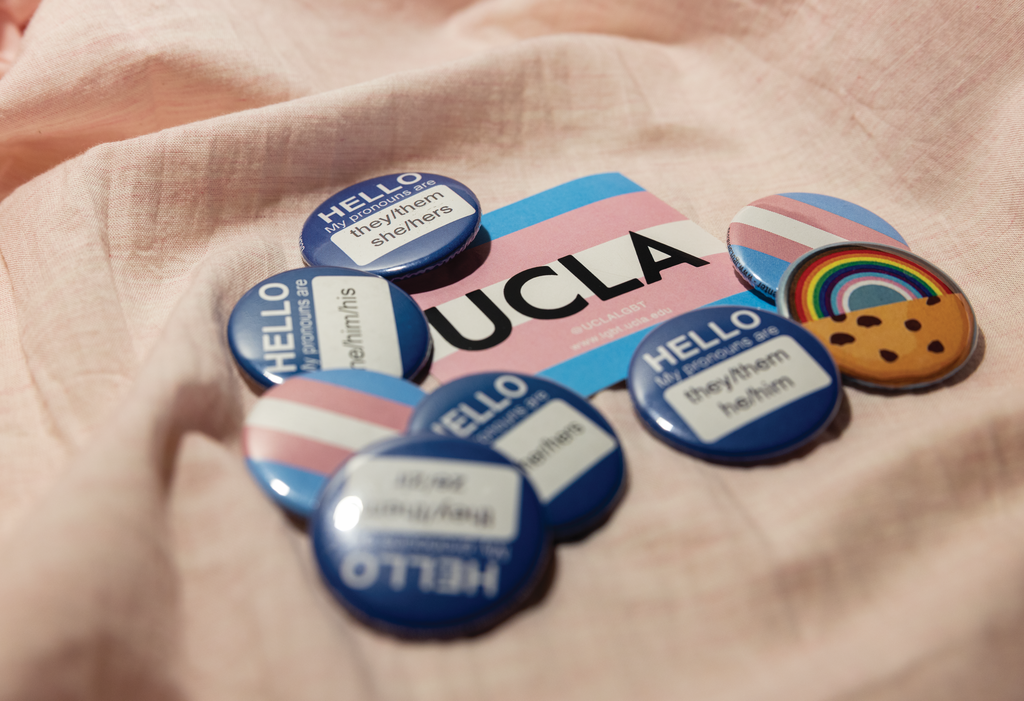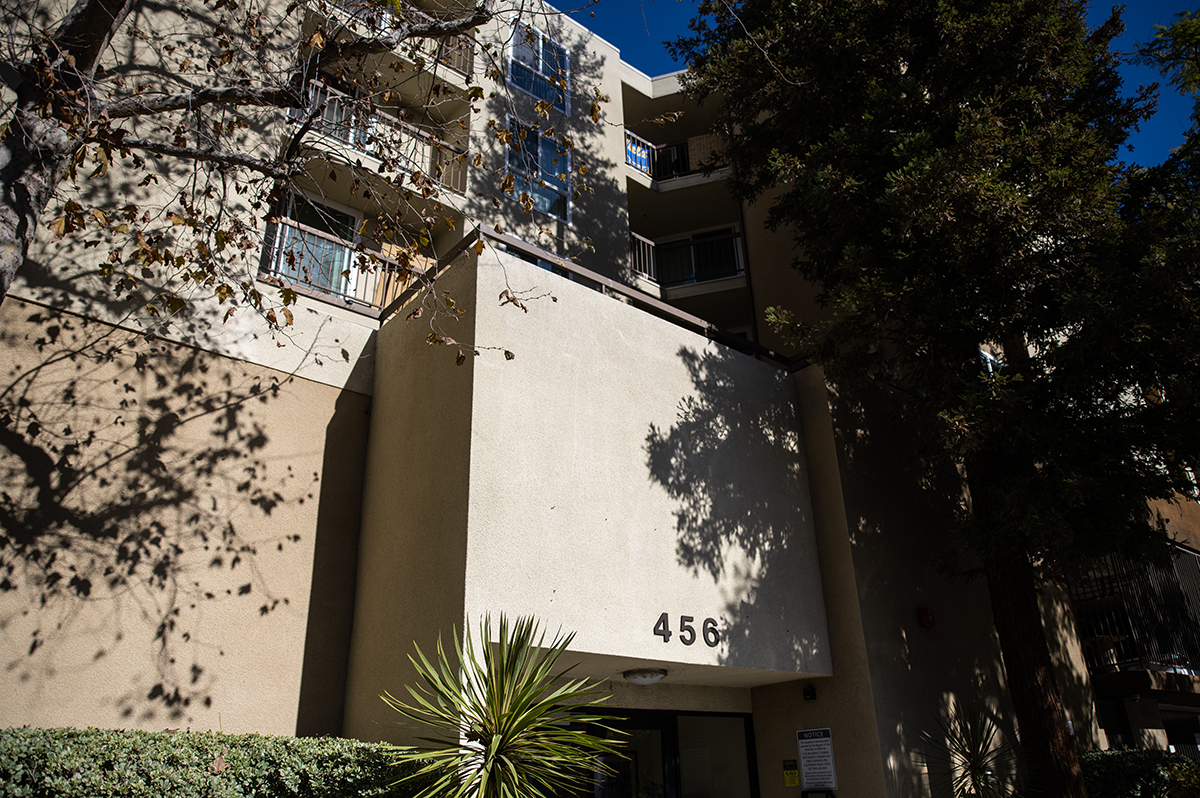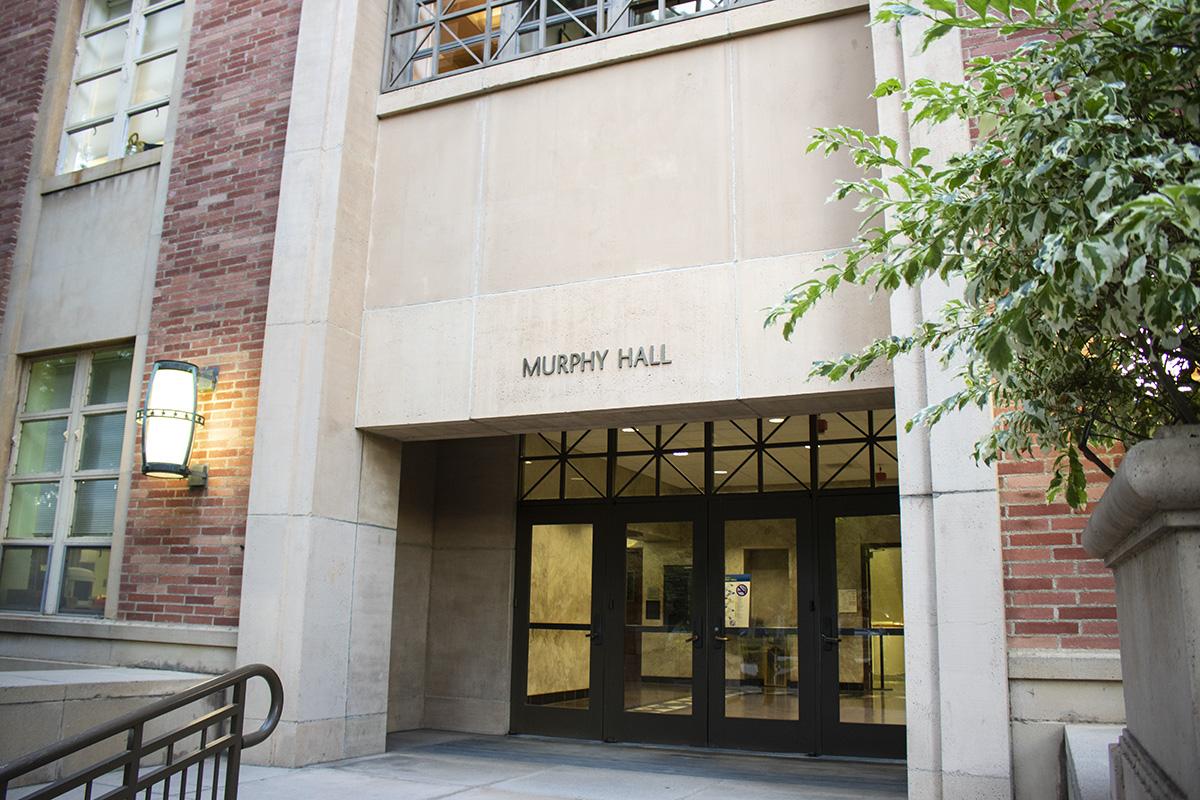In front of the background of Murphy Hall, where the UCLA Office of Equity, Diversity and Inclusion of Civil Rights is located, the words to the Title IX clause are shown. A Daily Bruin investigation has revealed various problems, such as lack of communication and transparency, that students who have worked with the office face. (Christine Kao/Daily Bruin staff)
By Samantha Parr, Dylan Tzung, Lori Garavartanian
August 19, 2023 at 8:42 p.m.
This post was updated Aug. 20 at 9:48 p.m.
In July 2018, Emily Martin filed an official complaint with UCLA’s Title IX office, alleging harassment by a superior. But despite working with the office for two years, she said she left feeling that they had produced no tangible results in her case.
Martin, who earned a doctorate in the astronomy and astrophysics department, is just one of many who have reported to the Title IX office and felt disillusioned by the results.
“There were no real consequences for his behavior,” Martin said. “And there are no real protections for me.”
For over 50 years, Title IX has protected against sex-based discrimination in federally funded schools, providing both students and employees an avenue to report issues ranging from gender-based discrimination to sexual violence and harassment.
An investigation by the Daily Bruin – which included analyzing six years of UCLA Title IX data and speaking with nearly a dozen individuals who have worked with or for Title IX – found a rise of 249% in the number of Title IX complaints filed at the university between 2015 and 2021. During the six-year time period analyzed – the most recent publicly available Title IX data for all the UC campuses being from 2021 – the number of reports increased from 391 in 2015-2016 to 1,363 in 2020-2021.
While the number of complaints surged, the office conversely experienced a decrease in formal investigations – a common next step initiated formally by the Title IX office – relative to this growth. Between the 2015-2016 and 2019-2020 school years, the office experienced a decrease from 49 formal investigations in the former time period to 39 in the latter. Although the number of formal investigations did increase to 49 in 2020-2021, because of the simultaneous increase in total allegations, UCLA’s ratio of formal investigations to total allegations was still one of the lowest across the UC, with UCLA’s Title IX office pursuing 3.6% of allegations as formal investigations.
UCLA’s Title IX Director Mohammed Cato said in an emailed statement that there are several possible reasons for the increase in initial reports. Cato pointed to education, outreach and better training for mandatory reporters as factors that could have led to an increased willingness to report.
But this increase in complaints and simultaneous decrease in formal investigations comes at a time when several students, including Martin, have expressed concerns about lack of transparency, lengthy investigation timelines and problems with responsiveness when working with the UCLA Title IX Office.
For Martin, her confidence in the office’s ability to protect her dwindled as the case progressed.
She first reached out to the Title IX office in October 2017. But, concerned about the potential repercussions on her academic career, she delayed a formal investigation until after receiving her PhD and opted to first pursue an informal resolution.
As opposed to formal investigations – which, according to the UCLA Title IX Office’s website, involve the collection of evidence and interviews with the complainant, respondent and relevant witnesses – informal resolutions are agreements between the involved parties and informed by suggestions from the Title IX office, said the UCLA Office of Equity, Diversity and Inclusion’s Civil Rights Office in an emailed statement.
Martin said her informal resolution, in which she and her superior agreed to a variety of provisions minimizing their contact, was cumbersome. In pursuit of longer-term protections, Martin initiated the formal investigation process the following July. However, according to the official Title IX report issued to Martin in December 2018, the investigator conducted three interviews – one with Martin, one with the defendant and one with a witness identified by Martin – before stating that there was not enough evidence to conclude that the respondent had violated sexual violence and sexual harassment policy or the Faculty Code of Conduct.
According to the report, the investigator also determined Martin’s academic experience had not been unreasonably interfered with, despite not interviewing any other faculty who could have spoken to the various negative impacts on her career and academic pursuits, Martin said.
In the absence of a favorable Title IX investigation outcome, Martin said she has continued to fear retaliation in academia. As a result, she said she is now abandoning her plan to become a professor and is instead pursuing an industry job.
Martin said the lack of a thorough investigation gave her little opportunity to provide her side of the story and no chance to respond to claims made by the respondent. In May 2019, she filed a complaint with the Academic Senate Charges Committee to refute the conclusion that the respondent did not violate the Faculty Code of Conduct. However, the committee upheld the findings of the Title IX office’s investigation.
“At the end of the day, I felt so misled by the Title IX office. I was very upset,” Martin said. “It was institutional betrayal.”
From 2015 to 2021, UCLA held the lowest average ratio between formal investigations to total allegations compared to other UC campuses. In the 2020-2021 academic year alone, UCLA conducted the second lowest number of formal investigations out of total complaints at 4%, while the similarly sized UC Berkeley conducted investigations for 5.8% of complaints, and UC Santa Cruz conducted the highest at 8.3%.
According to Cato, the decline in formal investigations is a symptom of a majority of individuals’ preference for informal resolutions. Grace Hong, director of the Center for the Study of Women and an Asian American studies and gender studies professor, noted that students often lose their agency in the Title IX process. Students might opt for alternative resolutions because the process can be less emotionally intense than a formal investigation and they typically have more control over the process, added Wendi Delmendo, chief compliance officer at the UC Davis Compliance and Policy office.
However, whether opting for alternative resolutions or formal investigations, many students said they are dissatisfied with the processes and outcomes they experienced working with the Title IX office.
“It’s probably not going to go the way you want it to go, and it might be re-traumatizing,” Martin said. “It might be years of wasted effort and energy.”
Zz Khan, an alumnus who graduated in 2023, echoed Martin’s concerns about the distressing nature of the process. Khan said the process was made more vulnerable by a vocabulary that stripped it of its humanity with a lack of trauma-informed language.
However, Cato refuted in an emailed statement that the office works to create a supportive and caring environment.
“Title IX staff always work with parties and witnesses in a manner that is trauma-informed, sensitive and empathetic,” Cato said in the statement.
An alumnus, who asked to be referred to as JG because of taboos surrounding sexual assault victims, said delays in the process made the already traumatic procedures worse. JG said that after she reported to the Title IX office in spring 2022, she was told pursuing an informal resolution would take three months – however, the outcome was not realized until more than a year after the initial report was made because the Title IX office would avoid providing dates for steps in the process. When they did provide dates, she said the office would continuously push the given date back.
Similarly, Khan said they were initially told it would take 90 days to start a formal investigation. But it ended up taking five or six months to get started, with the final report coming out another six months after they were told it would be ready, they said.
Cato said in an emailed statement that the Title IX office informs the involved parties during initial meetings that investigations will take at least 90 days and may require extensions to examine evidence and conduct follow-up interviews.
But amid all these delays, Martin said the attitude of UCLA’s Title IX office is one of disbelief.
“I felt like the Title IX office’s job was to protect the university and not to protect me – not to protect the person who had been victimized by the situation,” Martin said.
Multiple other students, including JG and Khan, also attributed problems with the predispositions of the investigators to the overarching intentions of the Title IX office. It’s unclear whether the intentions of the Title IX office are in the right place, Khan said. They added that from a student perspective, it feels as though the university is implementing measures only to seem safe to outsiders looking in.
Johnny Hu, an alumnus who graduated in 2022, also said the options available to him as a complainant were not made clear because of a lack of reliable communication from the Title IX office. With the office initially spamming him with information about counseling and support groups, he almost missed the email from the Title IX officer asking if he wanted to pursue the case further. On the other hand, he said they didn’t send a follow-up email to his complaint until a month after he first submitted.
Hu, who was set to graduate two weeks after he finally received the email, saw no point in continuing the case.
“It made me feel like it was all just a big facade to comfort the people who were victims and make them feel like they had some sort of power or some autonomy, when in fact, it felt very fragile and cynical,” Hu said.
Student legal services are listed on the Title IX office website as a confidential resource for students, who, according to Cato’s statement, are informed of their right to have an attorney act as their advisor. However, in an emailed statement, JG said they were not personally made aware of the option to use legal services and have a legal advisor, a factor which she said may have contributed to the mixed results of her case. Martin similarly added that she wished the office would convey to complainants the importance of bringing legal representation.
Between 2016 and 2021, UCLA averaged the highest number of total Title IX complaints – almost double that of UC Davis, which averaged second highest – across all UC campuses. While UCLA’s cases have steadily risen since 2015-2016, other UC schools, most notably UCSC, have seen consistent trends and more favorable investigation-to-complaint ratios during the same time period.
According to UCSC Associate Chancellor Anna Finn, the UCSC office tries to make the Title IX process more approachable by employing student interns who make the process more personal for students. Kyle Sasai, a complaint resolution officer at UCSC’s Title IX Office, said the Title IX officers themselves give first-year student orientation presentations, which Sasai said humanizes the process. UCLA’s approach for incoming students consists of a live Title IX presentation and online module.
Sasai added that the UCSC office also maintains transparency by setting clear expectations with respondents.
“We want to make sure that we are informing people about the reasons why we’re doing certain things as part of the process,” Sasai said. “If we’re asking someone a question, we try to help them understand why the question is being asked.”
With multiple students expressing concerns with the UCLA Title IX Office, calls have arisen for greater support from the office and from alternative resources.
After conducting a UC-wide survey in 2021 that found that 39% of survivors did not feel safe when interacting with Title IX staff, the UC-affiliated Survivors + Allies produced a list of demands for UC system-wide Title IX offices calling for better trauma-informed practices. Some of their demands included increased transparency about the budget of organizations such as UCLA’s Campus Assault Resources and Education, as well as Counseling and Psychological Services, and creating additional resources for marginalized student groups.
“I think there is absolutely stuff the UCLA Title IX office can do better right now,” Martin said. “It’s a system problem.”
Contributing reports from Junwon Choi, Daily Bruin senior staff.



